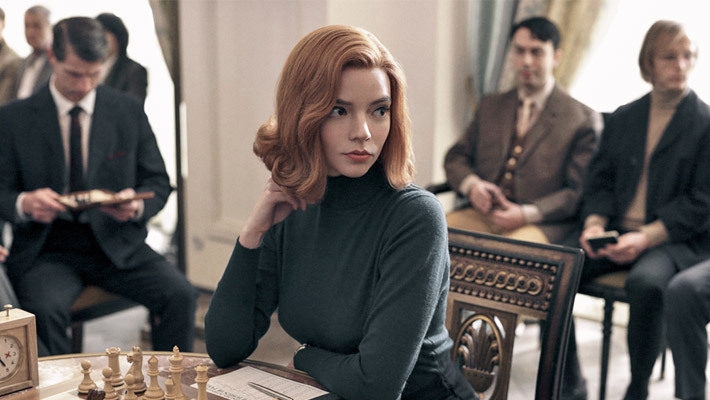There is something irresistibly appealing about a rags to riches story specially when the ‘rags’ are not so much about financial as creative wealth. As the future chess champ Beth Harmon, young actress Anya Taylor-Joy drew me so deep into her character’s dark complex world that by the time I finished all seven episodes of her incredible success story (no skips, no skimming over any episode) I was cheering for Beth as though she is someone I know well.
Not that Beth is a pleasure to know. Surly, withdrawn, introverted and addicted to pills and alcohol, she is an unlikely candidate for screen heroism, until we realize with a shock that heroism is not about winning but struggling to get there. From her beginnings as an abandoned child to her teenage years as an adopted child to her lonely climb to the top of ‘chess-dom’, the series brings to the table the kind of punctuated and clear emotions that reify some very sorted brains at work, as intelligent as the world of the chess masters that the narrative inhabits.
My favourite episode is the first one, where in a cheerful orphanage little Beth (played with such devastating wisdom and sobriety by little Isla Johnston) learns to play chess in the basement with the janitor Mr Shaibel (Bill Camp). My first thought on seeing the little girl in a dark dingy room with a sullen aging man was…is she safe? The series, in all its glorious colours of love and empathy, steers away from walking on the dark side of the moon. Even in her darkest mood Beth is in a safe comfortable place.
The intoxication, the scares and the anxieties are in many ways signposts of a life meant for greatness. You cannot achieve it without the falls, bumps, bruises and bitter experiences along the way. In spite of its tip into tonal darkness I found The Queen’s Gambit to be a very positive, edifying and exhilarating experience. At one point towards then end of the show, Beth’s closest female friend Jolene (Moses Ingram) compares her to the 1940s actress Susan Hayward. The comparison, though facetious, is not inapt. There is something intrinsically tragic and graceful about Anya-Taylor Joy. I would classify her as incontestably classy and one of the great actresses of this millennium; just wait and watch.
http://thebrownidentity.com/2020/11/07/happy-birthday-kamal-haasan-the-man-the-friend-and-the-actor/
Sadly, the men in Beth’s life come across as a wee wimpy and bit of a washout. Harry Melling, Jacob Fortune-Llloyd and Thomas Brodie Sangster (he was the cute little boy in Love Actually) struck me as most unworthy of Beth. Maybe that’s the father in me talking. Speaking of her adopted father, I have no decent words for him. It’s her adoptive mother Alma (Marielle Heller, brilliant) who comes across as the most vivid and delectable character after Beth. The mother-daughter adventures as Beth climbs from triumph to triumph across the world in the beau monde of the1960s, is so vividly portrayed that when tragedy strikes their relationship, I felt an emptiness engulf me. The Queen’s Gambit makes all the right moves, on and off the chess board. It moves you in ways that Netflix’s Indian content never can. It’s a work of pure, unadulterated art made for no other reason except that there was a story to be told.
